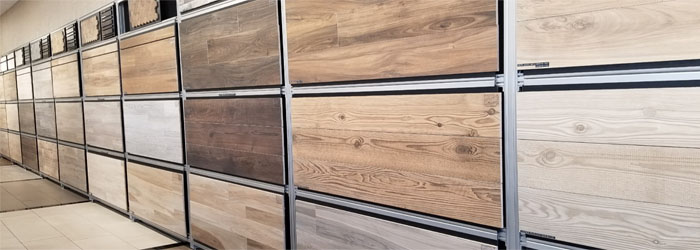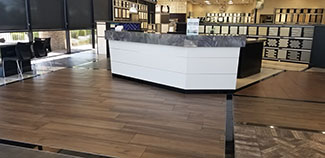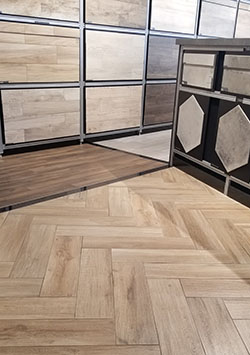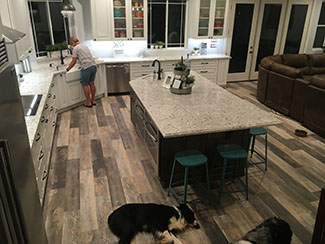Why Manufactured Flooring Lookalikes Have Become Big Sellers
 23 April 2019
23 April 2019 

What About Floors that Look Like Wood, But Really Aren't?
Many Arizona homeowners would like to have hardwood floors, but after thinking over the complications of installing real wood, the expense of it, and the temptation those floors might be for termites, they back off.

Recently however, homeowners have been tempted by unique new products that look like the real thing, are cheaper than hardwood, water-resistant, easy to clean; they may even have a non-slip finish. In some cases, you can even use them on a patio outside.
It all started several years ago when homeowners started warming up to luxury vinyl flooring, sold in wood-look "planks." That planking could cost as little as about $3 a square foot installed, only about a third of what it would cost to put in engineered wood. But that vinyl flooring may not be water-resistant and might last only three to five years.
The most recent products on the market are more attractive. At Arizona Tile (with five showrooms in Arizona), a best-seller is Aequa Tur, a porcelain tile made in Italy that comes in planks that really do look just like reclaimed wood and are much more durable. It comes in beige and other tiles in the Aequa series come in gray and brown.

According to Robin MacPherson, showroom consultant in Scottsdale for Arizona Tile, these planks can also be produced with an R11 Anti-Slip Finish. To get that rating, it means a person can maintain balance while standing on a wet tile at an incline of up to 27 degrees on the flooring. Anti-slip tiles can pave floors and walls of showers or possibly be used outdoors. Imagine walking seamlessly from your great room through doors that take you to a covered patio with all surfaces done in wood lookalike porcelain tiles.
Aequa Tur tiles are sold in planks – 8-inches-by-32-inches for $5.61 per square foot and 12-by 48 for $6.21 per square foot. Installation would cost extra. The tiles are installed on thin set and grout is also used.
If you're interested in a less costly alternative in "wood-look" flooring, during the past few years, a number of companies have invested heavily in improving the appearance and endurance of tiles in that category. Among them are Coretec, Gemcore, Paradigm, Eternity, Johnson Hardwood, and TecSun, according to Von Payne, owner of East Valley Flooring.
This new segment of the flooring market has a dozen acronyms, such as SPC (stone polymer core), MLF (multilayer floor), and more. All have similar composition and durability. Most are waterproof to damage from surface spills.
One new category of hard surface flooring is called WPC which stands for "waterproof core floors" or wood-plastic/polymer composite. It's a material often made of thermoplastics, calcium carbonate and urethane. These planks are waterproof to surface spills and have a rigid core that can even be used on subfloors that have imperfections. They do not have to be acclimated to the climate of your home before installation as real hardwood does. These products also can have a 25- to 50-year or even lifetime guarantee.

Von Payne recently tore out 2,200 feet of laminate in his own home, he told us, and installed WPC flooring. "Recently, my wife gave me an unsolicited testimonial and told me, 'This is the easiest floor I've had to live with in the 38 years we've been married.' "
Payne also said that for those living in the desert, installing a solid wood floor on a concrete slab requires a ¾-inch subfloor plus the solid ¾-inch wood. "So then you have a 1½-inch-high wood floor that has to transition to other lower level floors in a house that are covered with carpet or tile," he said. "That's not appealing to most customers."
So, if wood for your flooring has always been something you have yearned to have, maybe it's time to check out flooring that looks like wood and find out if it just might work in your house.
###
Photo Credits:
RELATED CONTENT:
- Blog: 7 Steps To A Perfectly Done Tile Floor
- Blog: How Much Time Will That DIY Project Take?
- Blog: Five Tips For DIY Tile Projects You May Want To Do
- DIY FAQ: Drywall Damage Patch & Repairs
- DIY FAQ: Four DIY Projects That Help Pay For Themselves
- Podcast: Make This Weekend a DIY Weekend at Your House
Print this page
recent post
- Duck, Duck, Duct! How Often Should Ductwork Be Cleaned?
- Vinyl vs. Fiberglass Windows: Which Is The Better Choice Of Replacement Window?
- We May Be The Grand Canyon State, But The Rocky Mountains Are Important For Arizona
- Welcome to Arizona! Things A Newbie to Arizona Should Know
- The Pros & Cons of Buying A Flipped House
- Getting In On The Ground Floor
- Why It’s More Critical Than Ever To Get Your AC Serviced Before Summer
- The Reality of Remodeling
- What To Look For When Comparing Your Roofing Quotes
- What To Expect When Buying New Windows & Doors
